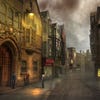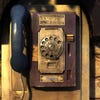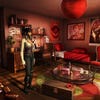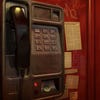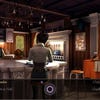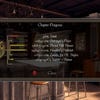Gray Matter
University challenge.
Regardless of the specific sleights and shuffles, the secret to every great illusion is always the same: hide the effort. It's here that Gray Matter – a game that's as much concerned with magic as it is science, and equally obsessed with imagination and memory – really struggles.
Somewhere, in amidst the muddle of threadbare technology, a fiddly UI and a convoluted narrative, you get glimpses of a game with real style and substance. The sheer difficulty in holding this wayward enterprise together, however, appears to have been too much.
Gray Matter is ambitious, literate and unusual. Sadly, it's also compromised, unconvincing and often dull. It can't hide the effort that's gone into putting it together, and therefore the illusion that makes the best adventure games so memorable is all but missing.
Gray Matter is the latest offering from Sierra On-Line design legend Jane Jensen. As creator of the Gabriel Knight series, she's a household name, but only, alas, in the kind of households that have a dream catcher and an antique globe in the living room. Her new game retains a handful of classic Jensen motifs – it's a mystery story with roots in history and pseudo-science – but throws in new characters and a fresh setting, shifting its attention from the US to Oxford and its ancient colleges.
The story kicks off on a suitably dark and stormy night, with American illusionist and ex-goth Samantha Everett breaking down en route to London, where she plans to work her way into the scarlet folds of the Daedalus Club, a secretive group of possibly rather sinister magicians. Seeking refuge from the rain, she ends up at Dread Hill House, a spooky mansion perpetually lurking beneath radioactive skies, where neurobiologist Dr David Styles is pursuing his research into Cognitive Abnormalities and needs an assistant.
Pretending to be that assistant, Sam eventually realises that something's awry with the frosty and disfigured Styles. His nightly visualisation experiments, conducted on a group of university students that Sam has helped recruit, are wreaking havoc in the real world, while the good doctor's dead wife appears to be reconstructing herself as memory turns to matter. What follows from that point on is a kind of point-and-click marriage of Umberto Eco and Andrew Lloyd Webber.
Gray Matter's technical and graphical failings are probably the most understandable of its shortcomings. Kicked between various publishers and developers during its lengthy production, Jensen's game wobbles early, and wobbles often.
The static backgrounds have an eerie prettiness to them with their thick drapery and dusty congregations of house plants, but the CG characters, poorly lit and blandly designed for the most part, float on top of them unconvincingly. As such, the game's 2D and 3D assets coexist in a ghostly state of perpetual awkwardness, like divorcees who, through some kind of sitcom contrivance, find that they must share a small bungalow together.
Animation is weak throughout – watching a character turn around or navigate a table and chairs can be so painful you'll want to push your way through the screen and help them. And while the music, by Jensen's husband and long-time collaborator Robert Holmes, is moody and likeable, it's partnered with stilted voice acting and sound effects of such bizarre poor quality that if you close your eyes it can be hard to tell exactly what's going on. Checking a locked door sounds like someone breaking open a fresh Kit-Kat, while morning coffee is accompanied by an audio clip that suggests Sam's being force-fed snooker balls.
These issues are forgivable by themselves, but they undermine Gray Matter's dramatic aspirations in a depressing manner, with the game's final confrontation being particularly poorly served. Thanks to muted sound, a limp cloud of particle effects and the seizure-style acting of the marionette cast, what was presumably intended as an earth-shaking supernatural display of apocalyptic intensity comes across with all the weight and drama you'll get from the business end of an ageing hair dryer.
(This drama isn't helped, incidentally, by a weird Arkansas hillbilly's interpretation of contemporary England, where the signposts are made of wood, the constables are called Reginald, and every shop door has a tinkly little bell at the top.)

